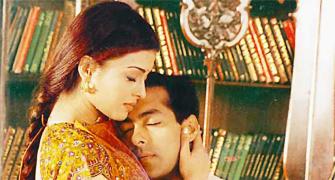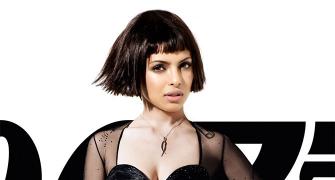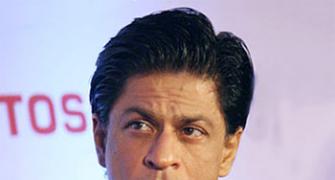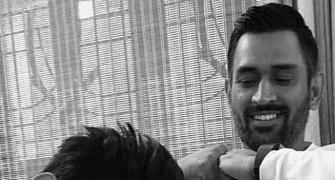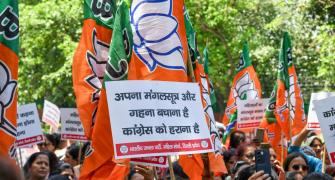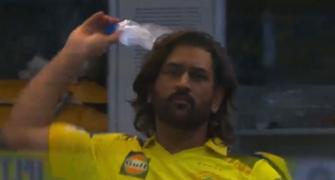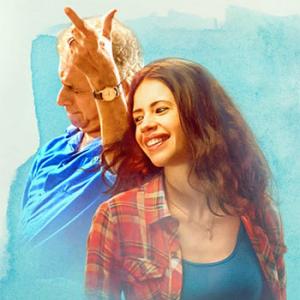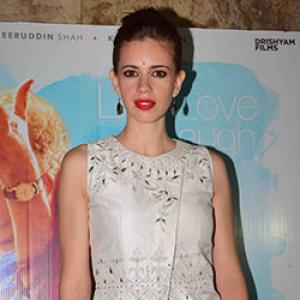She’s a rare breed in Bollywood.
Kalki Koechlin is always on time for her interview. And when she enters, she sits directly in front of the camera without fussing about a touch-up for her make-up or hair.
She’s also very clear about the questions she will, and won’t, answer.
The actress, whose film Waiting released to good reviews last week, speaks to Patcy N/Rediff.com about her forthcoming films, about how she has been lucky to have worked with talented directors, her thoughts on marriage and why she voices her opinion through YouTube videos.
Read on:
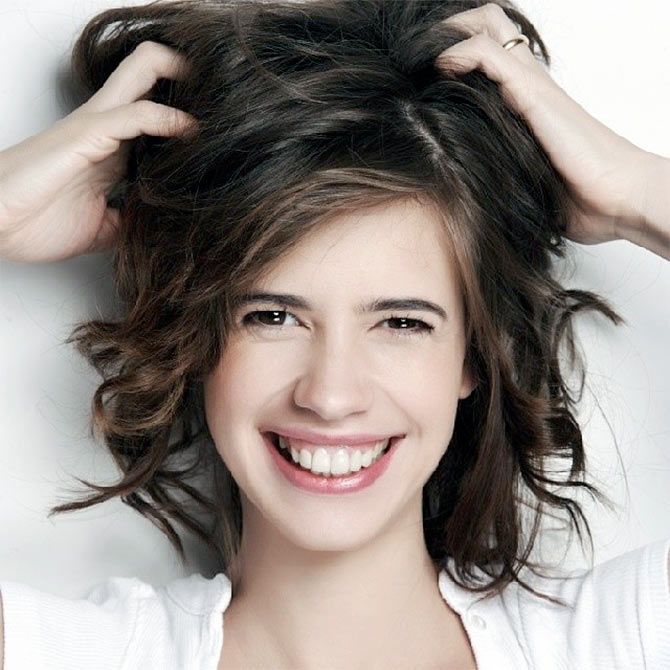
People refer to you as an actress who has found the balance between commercial and parallel cinema. How do you get the mix right?
I never look for Indie or commercial cinema. I look for good scripts and bad scripts (smiles).
Actually, it really doesn’t matter. Sometimes, I watch a brilliant commercial film or a really brilliant independent film. And sometimes I watch really bad commercial or independent films. That is the only difference.
I look for a good story, well told.
How do you decide that a particular story is well told?
The first thing is if I read the script in one go and it is engaging and I don’t keep stopping to check my phone or anything.
Then, when I finish reading the script, I want to do the subject immediately. I want to do more. It makes me more curious. If it is something I am learning from, I get excited.
The third aspect is practical. I see if I have done something like this before and ask myself if I can push in this direction.
Sometimes, the characters are very good but I feel I won’t be able to play it at this point in my life.
What are these characters that you think that you won’t be able to play?
Just something that would be unrealistic for me to play, like some gaonwali Bihari ladki (a Bihari village girl). It is not possible for me to look that way. (Or) If it is a very raw character which has to be very realistic.
There are certain roles that you know you won’t fit.
Do people really approach you with such roles?
Yes, sometimes they do (laughs). I tell them I don’t think I am the right person. Sometimes, there are challenges where I feel like, yes, this is a stretch where I can push myself and get there.
But otherwise you can’t.
What is the weirdest character that you have been offered?
I get a lot of weird characters. I don’t mind playing a girl who has grey shades, but when someone is just psycho for no reason, or just to make it dramatic, then that is very hard for me to connect with.
I have to understand what has made that person that way. There always has to be a balance or perspective.
What was working with working with Naseeruddin Shah again like (They worked together in That Girl In Yellow Boots; they were also part of Zindagi Na Milegi Dobara but did not share any scenes)?
It was great. Naseer and I got on really well this time. We have just become friends and it was far more comfortable than the first time when I worked with him in That Girl in Yellow Boots.
We had a really good emotional connect. These two characters really love each other in a strange way.
The age gap is way too much for them to have a romantic involvement but there is a deep connection that they feel. It was really important that we had that in our characters, so we found that.
There was respect for each other and we had fun on the sets.
What do you get to learn when you work with talents like Naseeruddin Shah and Suhasini Mani Ratnam?
I learnt a lot from observing Naseer. I think he is somebody who is very truthful to the character at all times.
It might be the simplest thing of how a character walks from here to there, why is he getting up, does he need to get up, does she needs to get up, can she say the same thing while sitting down -- all these questions of how a certain character behaves in a certain situation.
There were many a times when he and Anu (director Anu Menon) would argue about what the character should be doing and what is consistent for the character. Sometimes, he would win the argument and sometimes she would.
But that argument is so important and so is that confrontation with your director so that both of you are on the same page.
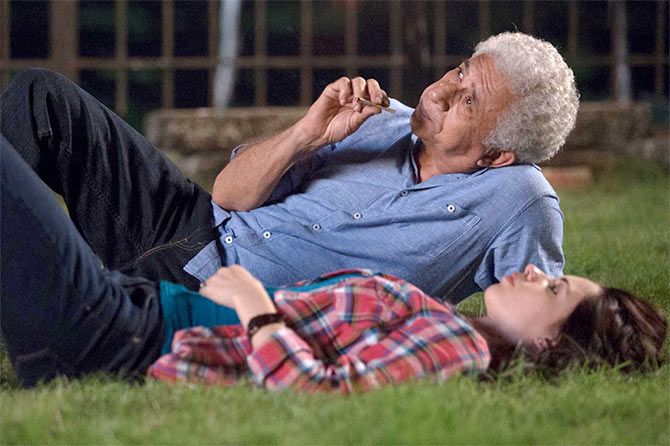
Anu Menon’s films (London Paris New York and X: Past Is Present) have not done well. Are Naseeruddin and Suhasini the reason you worked in Waiting?
Naseer came on board after me so that was not the reason.
I didn’t see Anu’s first film. For me, it is always the script and the connection that I have with the director when I meet them.
I loved the script and I immediately said it was very mature and honest. When I met Anu, I could see it was coming from a very real personal space. She had lived through this and that really showed in the script.
So, even the smaller characters -- like that of Rajiv Menon, Rajat Kapoor and Ratanbali Bhattacharya -- are so full in their own way.
They are real human beings and that, for me, makes it a whole script. I always look for that.
When you act in films like Margarita, With A Straw and Waiting, how easy or difficult it is for you as an actress to step out of the character once you are back home?
In Margarita, With A Straw, because of the huge physical transformation, I was taking the character home all the time. I was living the character 24 x 7.
With a character like Waiting, I felt the need to prepare a month before. I started dressing like her and speaking in her lingo. She has this weird mix of Hindi and English where she would say, ‘pakaoed (irritated)’ or ‘he was choosoing (sucking) everything out of me’.
I was getting used to that way of speaking. But I could also disconnect from it and go home without thinking much about it.
Different characters require different kinds of treatment.
Do some things stay back even after the movie is over?
When a film is over, I am so relieved. It’s like a weight is off my shoulders because you are living with the character and its problems throughout. It’s a relief to be Kalki again.
What I do get out of it is the experience. A way of thinking more about other people’s feelings. Each character is like living with a new person. You are putting yourself in the other person’s shoes, in that situation. So you become a little more sensitive to people who are in that situation, even if you haven’t been in that situation yourself.
Have any of your films left you disturbed?
It hasn’t disturbed me after I have done the film. But, during the making, it has.
I really struggled with the character in Shaitaan. It is exhausting to get into a psyche of someone who does a lot of drugs and booze, has lost her mind a little bit and is very vulnerable.
When you are in it, you feel drained and you have many questions. But once I am done with the character, it is like, 'thank God it is over' and I can go back to being carefree.
Have you ever watched a film by your contemporaries and wished you were in it?
I have said this before that I loved Queen and I would have loved to play Lisa Haydon’s role. I think she was brilliant in it and she is beautiful as well.
I speak French and Hindi fluently so I wondered why they didn’t at least audition me (laughs)!
Can you tell us a bit about Nicholas Kharkongor's Mantra (Kharkongor has earlier directed a short film, Fair And Lowly)?
Again, it is the script. He’s a very good writer. It is a sensitive and mature script based on India in the 1990s, when multinational companies bought over smaller Indian companies.
Rajat Kapur plays my father and the owner of one such business that goes bankrupt. It’s a story I am familiar with… growing up in the 1990s when, one day, you had Uncle Chipps and Gold Spot and suddenly it was all Coca Cola and Nutella.
I was very familiar with those changes in my childhood and it was really nice to connect with a story like that.
I think he is a very good director.
You are also doing choreographer Howard Rosemeyer's directorial debut, Jia Aur Jia, with Richa Chadda.
We did this film more than two years ago. It is a lovely script, a girls’s road trip through Sweden. It is like a Zindagi Na Milegi Dobara.
I love it. The film is complete but I don’t know what’s happening with the release plans. It is stuck for reasons I am not familiar with and I don’t like to nag people about these things. For me, the process is more important and I enjoyed working on that film.
Both of us are playing two different girls called Jia. I think she is playing a South Indian Jia Venkatram while I am playing a Punjabi Jia Agarwal. We are playing (real-life) opposites. So I was teaching her Tamil words and she was teaching me Punjabi words.
She is playing a very kadoos, serious business woman who is depressed all the time and I am playing the one who believes that life is beautiful, everything is fine; she lives in the moment.
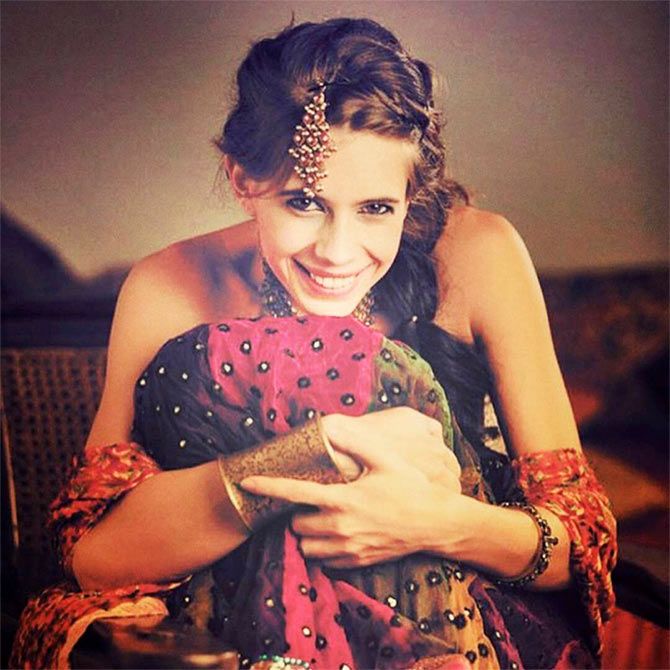
Are you like that in real life?
I can be both. There are times when I am super bubbly and happy and there are times when I think what the point is because we are all going to die (laughs).
Howard is a choreographer. Is he different as a director? Does he think everything musically?
(laughs) He has the energy of a choreographer. Even if it is an emotional scene, he would scream (enacts and starts shouting), ‘Oh yes yes that’s it. I want to see that emotion coming out. Yes, it is so beautiful.’ (Laughs) He talks like that and I think that’s his choreography coming in.
At the same time, he is very sensitive as a person and that comes out in his direction. I hope this film comes up good. And because he is a choreographer, he made me dance to a full song, Naach Basanti naach.
Yes, I danced in Yeh Jawaani Hain Deewani but here I am the main dancer. It was very tough and I was very nervous.
Tell us about Konkona Sensharma’s directorial debut, A Death In Gunj. I heard you play an Anglo-Indian woman and you are learning Bengali and doing a workshop for the film.
Yes, I learnt some Bengali. I play a character who is half-Bengali, half-French. Her name is Mimi, short for Mithali.
She is a confident and beautiful woman in her thirties who is a writer. She is intimidating and self-centred.
The film, a drama based on a true story set in the 1960s, is about how we treat each other as human beings. It was a lot of fun.
Konkana is a first time director. What was she like on the sets?
She is a taskmaster. She is such a brilliant actor herself that she actually acts out the scenes. She would say, ‘Do it like this,’ and I would think, ‘Oh. now I have to be Konkana’ (laughs).
Actually. she is very precise and, because she’s been around cinema all her life, she really knows her frame, her edit and the visual element, which directors don’t talk about very much. I found that quite impressive.
Could you tell us a bit about Candyflip?
Candyflip is a film by a friend of mine, Shanawaz N K. I just know that whole gang. Prashant Prakash, who is playing the main lead, and I wrote (the play) Skeleton Woman together.
Candyflip is a technical term that refers to the way your mind just flips when you take drugs. And that is what happens to this character; he becomes delusional. It’s a dark tale about drugs and what it can do to you.
It is set in Goa and I make a guest appearance. I play this ideal character in his life; you don’t know whether she is real or not. It is difficult to explain; you have to watch the film to understand it.
Is it difficult for an outsider to get a foothold in Bollywood, especially without a godfather?
But there are so many of outsiders now like Nawaz (Nawazuddin Siddiqui) and Radhika (Apte) and my contemporaries like Richa (Chadha) and Huma (Qureshi). It is a great time in the industry.
Things have changed in the last 10 years. It is not that it is not difficult any more.
(But) It is still difficult for any actor. The stakes are high and unpredictable. But, with financing coming from outside of the industry, and crowd-funding coming in, it is much easier for people to make films.
The plots are also changing and there is a need for more diverse actors.
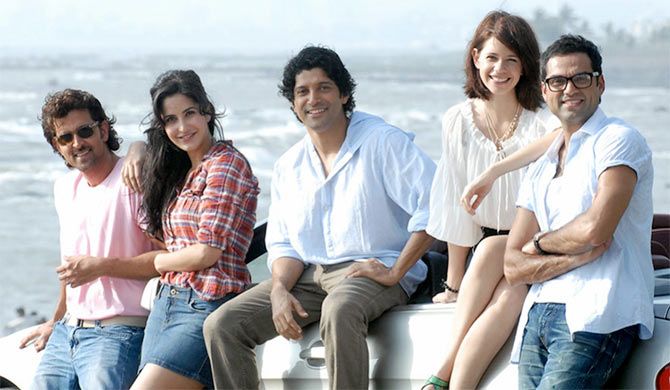
Do you think Bollywood has a long way to go and needs to come out of the comfort level of having so much drama and song?
Films need to live side by side. I want to go and watch an entertaining film and sometimes I want to watch a documentary or a serious film. We need to open those spaces up.
It is just that a lot of our commercial films overshadow every other film. Just look at the brilliant Marathi films that have come out in the last few years, like Court, Killa and Fandry.
There so many brilliant films and we hardly get to see them because they are not given priority. That’s important.
I don’t want to do away with the amazing commercial cinema that we have. I love Zoya Akhtar’s films though they are out-and-out commercial entertainers.
How would you describe your filmi journey so far?
(Thinks for a while) I would say mercurial, up and down, exciting, unpredictable, challenging, lucky and great.
Why lucky?
I got to work with some of the best directors in the country. I am not exaggerating.
For me, Dibakar Banerjee is one of the best directors we have, as are Anurag Kashyap and Zoya Akhtar. And they all have very different forms.
I have also worked with new directors.
You cannot predict or know for sure and, even if the script is good, it can turn out to be a very bad film because of lack of experience or lack of team work. It is such an important thing for a film to have good production.
Sometimes it’s a risk to work with a new director but I have worked with several of them and I’ve always been happy about it. So I am just lucky (laughs).
Tell us about your theatre company, Little Productions. What’s happening on that front?
I started it because I wanted to direct a play I had written called The Living Room, a comedy on death. I needed a company to register it under, hence Little Productions. Right now, it is only for this one play.
I might not have time to direct many plays but I hope, in the future, to produce other people’s plays.
You create YouTube videos with different organisations to create awareness about different things. What are the causes you associate with?
I feel strongly about women’s rights. We have all faced these problems. It is not just a national problem but a worldwide problem.
Women playing important mainstream roles will change the perspective on everything.
When you have more woman directors, your films change, your storylines change.
If women are heading a marketing company or an advertising company, then you are not selling just boobs. You find other things to show.
We need to find a balance in society between men and women. We need equal respect. Pay parity is a problem in Hollywood as much it is in Bollywood; it’s there the world over. Financial support always brings people up and gives them more power.
Children are the future. They are the only ones who can save the world so let’s protect them and educate them and respect them.
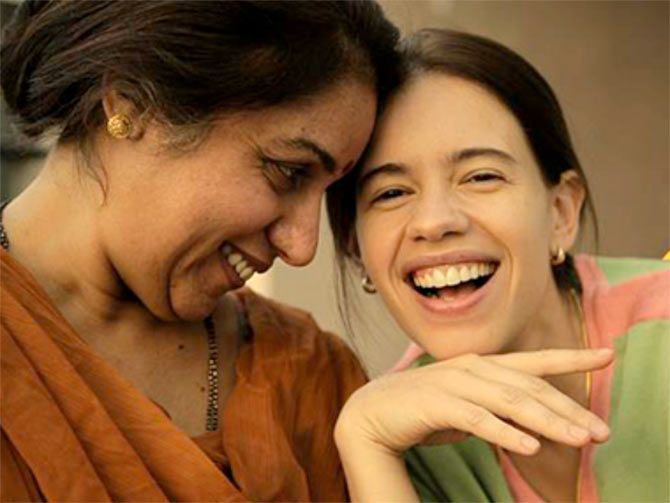
A National Award (Kalki won the special jury award for Margarita, With A Straw) is a validation of your talent but do you think it changes anything? What do awards mean to you?
Let’s see. I will find out in one year (laughs). Right now, I am just thrilled that I got the award. My mom was very thrilled; she told the whole of Pondicherry!
At the same time, I don’t believe in living for an award; you’ve got to live for your work. The real award for me is my work. But the National Award is high up there. I feel it is the most prestigious award. It is a great chance to mix with very talented people from all over the country.
Have you faced discrimination because of your looks?
I am firang (laughs). No, I am Indian. My skin is white, my heart is brown.
I guess you are always limited by the way you look but I won’t say I have been discriminated against. Richa Chhada will not play the character I play and I will not play the character she plays. We both have different looks.
It plays both ways. Some people are obsessed with fair skin which is sad.
At the end of the day, you have to prove yourself with your talent, keep surprising people and be interesting enough so that they want to see you again and again.
In a recent interview, you said marriage is the most innocent thing you have ever done in your life. Could you explain that?
(Laughs) That quote was taken out of context as always. But I do think you need a lot of innocence and lot of trust for any long term relationship to work.
When you are committed to somebody, you’ve got to have a lot of faith.

